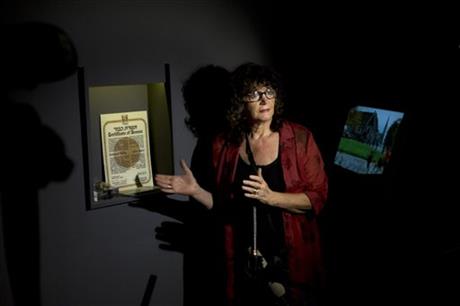
By MARIAM RIZK and KIRSTEN GRIESHABER
FILE – In this Monday Sept. 30, 2013 file photo, Irena Steinfeldt, an official at Israel’s Yad Vashem Holocaust memorial, shows a certificate recognizing Mohamed Helmy, an Egyptian physician in Berlin, as “Righteous Among the Nations” for saving a Jewish family during the Holocaust, in Jerusalem. A member of the family of the first Arab honored by Israel for risking his life to save Jews during the Holocaust says the family isn’t interested in the recognition. The Egyptian doctor, Mohamed Helmy, was honored posthumously last month by Israel’s Holocaust memorial for hiding Jews in Berlin during the Nazis’ genocide, but a family member tracked down by The Associated Press this week in Cairo said her relatives wouldn’t accept the award, one of Israel’s most prestigious (AP Photo/Sebastian Scheiner, File)
CAIRO (AP) — A member of the family of the first Arab honored by Israel for risking his life to save Jews during the Holocaust says the family isn’t interested in the recognition.
The Egyptian doctor, Mohamed Helmy, was honored posthumously last month by Israel’s Holocaust memorial for hiding Jews in Berlin during the Nazis’ genocide, but a family member tracked down by The Associated Press this week in Cairo said her relatives wouldn’t accept the award, one of Israel’s most prestigious.
“If any other country offered to honor Helmy, we would have been happy with it,” Mervat Hassan, the wife of Helmy’s great-nephew, told the AP during an interview at her home in Cairo this week.
Mohamed Helmy was an Egyptian doctor who lived in Berlin and hid several Jews during the Holocaust. Last month, he was honored by Israel’s Yad Vashem Holocaust memorial as “Righteous Among the Nations” — the highest honor given to a non-Jew for risking great personal dangers to rescue Jews from the Nazis’ gas chambers.
On Sunday, the museum criticized the family’s decision. “We regret that political sentiment seems to have overcome the human aspect and hope one day that the latter will prevail,” Yad Vashem said in a written statement.
Typically, the museum tries to track down living family members to present the award in a ceremony, but in the case of Helmy, who died in 1982 in Berlin, Yad Vashem said it had not been able to find any living relatives.
With the help of a German historian, the AP obtained the certificate of inheritance of Helmy’s wife Emmi, who died in 1998. The document contained the names of three relatives in Cairo, and when contacted by the AP, Hassan agreed to share her memories of Helmy.
Hassan said the family wasn’t interested in the award from Israel because relations between Egypt and Israel remain hostile, despite a peace treaty signed more than three decades ago. But, she cautioned, “I respect Judaism as a religion and I respect Jews. Islam recognizes Judaism as a heavenly religion.”
The family’s reluctance to accept the prize highlights the lingering hostility toward Israel felt by many Egyptians, even after the two countries signed a historic peace treaty in 1979. While security ties between the nations are tight, political relations have always remained cool and many ordinary Egyptians remain hostile to the Jewish state. Holocaust denial is also common throughout the Arab world, where recognition of the Holocaust is often seen as undercutting Palestinian suffering.
“Helmy was not picking a certain nationality, race or religion to help. He treated patients regardless of who they were,” she said.
Dressed in a veil, the 66-year-old woman from an upscale neighborhood of Cairo was pleased to talk about her husband’s great-uncle. She and her husband, who did not want to give his name to the AP, say they visited Helmy regularly in Germany.
Helmy was born in 1901 in Khartoum, in what was then Egypt and is now Sudan, to an Egyptian father and a German mother. He came to Berlin in 1922 to study medicine and worked as a urologist until 1938, when Germany banned him from the public health system because he was not considered Aryan, said Martina Voigt, the German historian, who conducted research on Helmy.
When the Nazis began deporting Jews, he hid 21-year-old Anna Boros, a family friend, at a cabin on the outskirts of the city, and provided her relatives with medical care. After Boros’ relatives admitted to Nazi interrogators that he was hiding her, he arranged for her to hide at an acquaintance’s house before authorities could inspect the cabin, according to Yad Vashem. The four family members survived the war and immigrated to the U.S.
“I think it’s remarkable, it’s inspiring,” said Irena Steinfeldt, director of Yad Vashem’s “Righteous Among the Nations” department.
After the war, Helmy picked up his work as a physician again and married Emmi. The couple never had any children.
“They did not want to have children for fear of the wars,” remembered Hassan. “They did not want them to see the horrors of war.”
Yad Vashem says it has other names of relatives of Helmy that appeared in his will as his heirs and Yad Vashem forwarded this information to the Egyptian ambassador in Israel and were informed that authorities in Egypt were looking to find them.
_______
Grieshaber reported from Berlin. Associated Press writer Aron Heller contributed to this report from Jerusalem.



